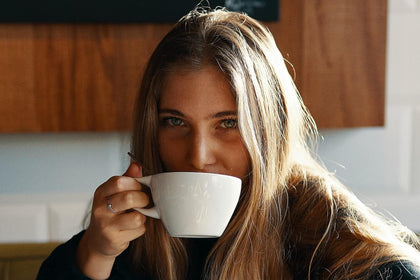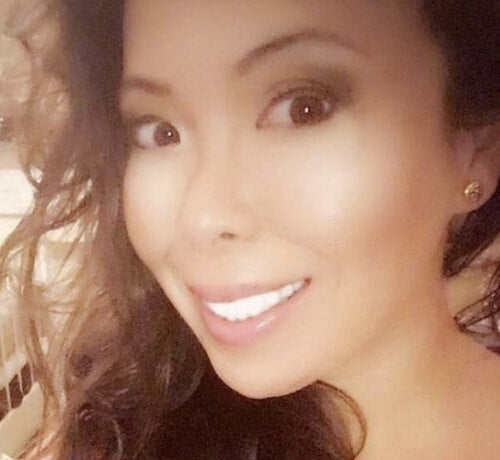You look forward to kick-starting each day with your morning coffee ritual — but could there be a connection between too much caffeine and hair loss?
Before you skip that oh-so-essential daily buzz entirely, read on to learn more about whether there may be a link between excess caffeine and hair loss or hair thinning. Plus, boost your hair wellness routine by learning which products you should be using to help combat thinning hair today.
The Caffeine Rundown
So many of us start the day with caffeine. While caffeine intake is often associated with our morning coffee, there are numerous ingestible sources of caffeine that go beyond coffee consumption. Caffeine is found in a wider range of drinks and foods, including tea (and matcha), chocolate, soda, some supplements and yes — even decaf coffee. In recent years, caffeine is also found in topically applied hair and skin care products.
But what is caffeine? In its pure chemical form, caffeine appears as a white powder with a bitter taste (its chemical name is 1,3,7-trimethylxanthine). It works by binding to adenosine receptors in the brain, blocking the hormone adenosine, which helps the body enter deep sleep. That's why caffeine helps you wake up.
VEGAMOUR spoke to holistic plastic surgery expert Dr. Shirley Madhère, MD, founder of Jet Set Beauty Rx, who emphasized that caffeine isn't a lab-created synthetic — it's a naturally occurring ingredient in over 60 plant species around the world, including cacao beans, tea leaves and coffee beans. Aside from drinking coffee, caffeine may have positive effects in hair growth and preventing hair loss.
#include-related-slider#
Does Caffeine Negatively Affect Hair?
The short answer: Not necessarily. The longer answer: It's up in the air. Whether caffeine has negative effects on hair regrowth — and whether it can be linked to hair loss — is not fully known. According to Dr. Madhère, more research is needed to explore whether too much caffeine intake has a direct connection to hair loss.
"There is conflicting data regarding hair loss and caffeine ingestion," Dr. Madhère explains. "Some reports suggest that high caffeine consumption may contribute to hair loss, while other studies report that caffeine may, in fact, stimulate the hair follicles. "
While the science is still hazy on the connection between hair follicle stimulation and caffeine, the good news is that you don't have to quit drinking coffee. Instead, monitor your caffeine consumption and how it impacts your body's unique needs. We don't have all the answers, but there's plenty of well-established information on caffeine and hair loss out there to help you decide if (and how) caffeine should be a part of your morning or hair care routine.
Related: 3 Ways Nutrition Impacts Your Hair
How Might Caffeine Help Hair Growth?
While too much caffeine has negative associations with jitters and anxiety, when appropriately used, caffeine has demonstrated benefits in the body. One promising feature: Caffeine helps boost metabolism, increase blood circulation and improve energy levels.
"Caffeine is best known for acting as a central nervous system stimulant," Dr. Madhère explained. "It also has anti-inflammatory and diuretic effects. And, it may also affect brain metabolism and mental state."
As a stimulant, caffeine — when used appropriately — has the potential to support circulation. For instance, it can improve exercise performance and improve energy levels. But those benefits may extend to the scalp, which could be promising for hair growth as well as hair loss prevention.
Read: Proven Peptides for Hair Growth
Connecting Caffeine and Hair Health
For those with thinning hair or hair loss, there may be good news, whether or not you're the type of person who drinks a morning coffee. Regardless of your coffee intake, topical application of caffeine-containing products may have the potential to help support healthier hair without the jitters.
"Interestingly, because caffeine easily crosses the skin barrier to get into the skin — i.e., it has high bioavailability — it may be well-suited to benefit in improved hair growth as a topical application," explained Dr. Madhère. "In some studies, caffeine has been shown to increase the expression of a growth-promoting protein in the hair follicle to stimulate hair growth."
In recent years, caffeine has started to be used in more topical applications to promote hair growth and prevent hair loss. Caffeine is featured in VEGAMOUR's own GRO Hair Serum.
Integrate hair wellness habits in your regular routine by pairing GRO Hair Serum with the GRO Revitalizing Scalp Massager. The scalp massager promotes increased circulation in the blood vessels surrounding the hair follicles. Plus, a soothing scalp massage is a relaxing way to unwind each night. Try this routine designed to support hair follicles and stimulate hair growth:
- Use GRO Hair Serum, which includes caffeine in its ingredients, on dry or damp towel-dried hair to spot-treat areas of thinning hair along the part and the hairline.
- Use the revitalizing scalp massager, which bolsters circulation in the scalp, to massage serum into the scalp and hairline directly to distribute serum product evenly.
- Style as desired, leaving the serum in.
Related: How VEGAMOUR's GRO and GRO+ Collections Differ
Controlling Caffeine
We all know that there can sometimes be too much of a good thing. Consuming excessive amounts of caffeine, whether from too much coffee or caffeine from other food and drink, can potentially lead to other health problems down the road.
Drinking coffee or otherwise ingesting excess caffeine may come with other health risks, according to Dr. Madhère. These include but are not limited to health issues like:
- Insomnia
- Anxiety
- Headaches
- High blood pressure
- Increased heart rate
- Digestive issues
- Dehydration
- Chemical dependence or addiction
- Inhibited iron absorption or iron deficiency
The bottom line, according to Dr. Madhère: "As with all plant-based ingredients that have medicinal properties, one must be cautious with these actives." This means you should keep your caffeine intake in check so you can avoid its downsides.
Related: Here's How Gut Health and Hair Loss are Related
Caffeine, Cortisol and Tress Stress
It's no secret that stress can send your body off-kilter, including leading to potential skin and hair issues, serious hair loss or issues with the hair growth cycle. Stress is correlated with shifts in the levels of the hormone dihydrotestosterone, also known as DHT, which plays a role in the active growing phase of the hair growth cycle.
"Caffeine can act as a stressor, too, and elevate cortisol levels when consumed in high amounts," said Sarah Koszyk, MA, RDN, registered dietitian nutritionist and co-founder of MIJA. "Be cautious of drinking a lot of caffeine when feeling tired or stressed-out. Instead, opt for a decaffeinated coffee or matcha-based drink which has L-theanine, a slow-releasing caffeine which promotes calmness."
One of the most common forms of hair loss is androgenetic alopecia, commonly known as male-pattern baldness. But beyond male-pattern baldness, androgenetic alopecia can also occur as a form of hair loss in females, and it's often correlated with stress. If you are dealing with hair loss, work on controlling how much caffeine you consume on the regular, as well as managing other lifestyle factors. This may help to minimize the detrimental effects of too much caffeine and maximize its potential benefits toward preventing hair loss.
Related: How Does Cortisol Affect Hair Loss and Growth?
Reduce Stress and Stimulate Hair Growth
We all know that too much stress can be an issue. Luckily, there are plenty of ways to reduce stress directly on your hair follicles and in your life overall.
For direct support on hair follicles and scalp, try GRO Hair Serum. In addition to caffeine, the serum also includes red clover and mung bean. Encourage thicker, fuller hair in as soon as 90 days of consistent use.
Also consider integrating other stress-reducing techniques in your day-to-day life, including:
- Incorporating relaxation and mindfulness rituals
- Practicing stress-reducing yoga
- Indulging in a hair wash routine to support relaxation and wellness
- Minimizing stress-inducing habits and activities
- Maintaining a balanced, nutrient-rich diet
- Take hair- and health-boosting supplements
- Exercising daily
- Prioritizing self-care
Shop: GRO Collection for Thinning Hair
To Prevent Hair Loss, Find Balance
In our busy lives, it can feel like our whole world is over-caffeinated. So be mindful, coffee drinkers and other caffeine connoisseurs: Maintaining balance is key, in life, as well as within your skin, scalp and hair routines.
"One of the things that is so incredible about the human body is [that] each person interacts with a substance differently than another person: One person’s medicine may be another person’s poison," Dr. Madhère says. For instance, "because of various rates of metabolism, caffeine may have side effects in one person and not in a different person who applies or ingests the same amount."
The best course of action is to pay attention to how caffeine affects your personal health. Knowing how your own body reacts, and even how you react differently depending on your life circumstances, will help you find a healthy and balanced relationship with caffeine.
Generally speaking, Dr. Madhere advises that “up to 400 mg of caffeine is generally safe for most healthy adults." That's approximately 4 cups per day — also the amount recommended by Mayo Clinic.
Read more: How to Minimize Hair Loss From Stress
Perk Up Your Wellness Routine
Once you have a thorough understanding of your body's reaction to caffeine, you'll open up opportunities to try using it to promote hair growth and support healthy circulation.
VEGAMOUR spoke to Emre Dogu, director of product development and beauty scientist at Mario Badescu, who explained that "Caffeine can help reduce dark under eye circles and improve blood flow under the eyes.” Dogu added that "Caffeine can reduce puffiness, improve skin tone and texture by helping boost circulation.”
The circulation-boosting benefits of caffeine on the skin extend to the scalp — the skin from which each hair follicle grows. Consider including GRO Hair Serum, which contains caffeine as an active ingredient, into your styling routine. The serum can help enhance visible hair density and the appearance of thicker hair.
The Takeaway
There's no concrete connection between caffeine and hair loss issues, so don't rush to ditch your daily coffee pick-me-up. In fact, caffeine may actually provide benefits to hair growth. Instead of completely forgoing caffeine, add balance by integrating daily self-care rituals that help encourage healthy hair and overall wellness.
Make lifestyle changes that increase your overall well-being, including limiting daily caffeine, and try adding extra nutritional support with biotin-rich hair supplement, jam-packed with essential vitamins, minerals and nutrients. Finally, utilize a holistic approach by integrating hair wellness products designed to help your hair, skin, mind, body and spirit achieve their very best.
#include-related-slider#
More From VEGAMOUR
- How to Tell If Your Hair Is Thinning
- 12 Protein Sources to Add to your Diet
- What Your Hair Can Tell You About Your Overall Health




















